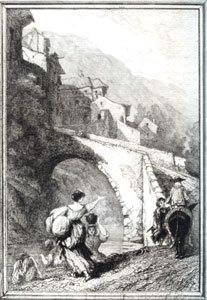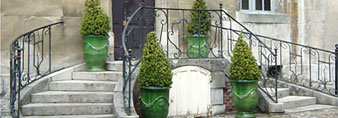| Fables, Jean de La
Fontaine, Book III, fables 1, 2, 3, 4 |
|
| |
THE MILLER, HIS SON AND ASS (III,1)
To M. D. M.
(M. de Maucroix :a witty canon of Rheims,
and an intimate friend of Jean de La Fontaine)
Arts claim a birthright where they first arise ;
We owe the apologue to Greece so wise ;
But ancients could not reap the field so clean,
That moderns, later comers, should not glean.
Fiction's a country full of deserts drear‑
Yet authors there still find some hidden lore ;
On this a tale worth your attention hear,
Which Malherbe told to Racan long before.
Rivals of Horace both—heirs of his lyre,
Their scholars we—Apollo was their sire.
One day they met alone—no witness there,
They to each other trusted thoughts and care.
Racan began “ Sir, end my inward strife,
You who must know what's going on in life,
You who have walked so long upon its stage,
Whom nothing 'scapes in so advanced an age :
How should I act ? ’Tis time to think, in short.
You know my birth, my talents, and estate,
Should I in rural life avoid the great ?
Or try the army, or some place at court ?
The world is mixed with bitterness and charms,
Mars hath his sweets, and Hymen his alarms ;
My taste alone I could direct with ease,
But I've my friends, people, and court to please.”
Malherbe exclaimed : “ To please them all you'd try ?
Hark to my story ere I make reply :
“ A miller and his son I've somewhere read—
The father old, the son could gain his bread,
A lad fifteen, if memory do not fail‑
To sell their ass went one day to the fair,
And that Sir Johnny might look fit for sale,
They tied his feet, and carried him with care.
Jack from their shoulders like a lustre hung,
Jackasses all, fools ignorant as strong.
The first who saw them into laughter broke :
‘ Rare sport,’ he cried, here is some pretty joke ;
The greatest ass is not the shaggy moke.'
The miller heard, and owned his ignorance,
Untied the animal, and bid him prance.
But Jack, who liked to swing, a thing so rare,
Wailed in his brogue ; the miller did not care ;
Mounted his son, and followed ; when by chance
Three merchants passed, and, angry at the sight,
The eldest bawled, “ For shame ! ” with all his might.
“Come down, you lazy dog ! and let me say,
Your footman should not wear a beard so grey.
You ought to walk, the old man needs the ride.”
“ Pray don't be angry, sirs, ” the miller cried :
The lad came down, the father took his place.
Three lasses passed, one cried, “ Oh what disgrace !
To see a charming youth so sadly treated,
While that old prig is like a bishop seated ;
A calf on ass-back, yet he apes the sage.”
“There are no calves,” he answered, “ at my age ;
Go on, my lass, and bear this in your mind.”
After much talk, retorts of various kind,
He thought her right, and placed his son behind.
Not thirty yards ahead another troop
Met this unhappy, censured little group‑
And they found fault again ; one cried, “ They're mad,
The beast knocked up will die beneath their blows ;
Monsters ! to load and treat an ass so bad : '
Thus their old servant quite unpitied goes.
“ D'ye wish to sell his skin at yonder fair ?”
“Zooks ! ” cried the miller, crazed must be the brain
That thinks to please as many as may stare ;
Let's try, however, if it can be done :”
And the obliging pair jumped down again,
While Jackey like a prelate marched alone.
A fellow met them, and exclaimed : What, ho !
An ass so light, and miller limping slow.
Which for fatigue, I wonder, was designed ?
They ought to get their favourite friend enshrined.
What ! wear their shoes out to preserve an ass !
Not so does Darby visit Joan his lass.'
He mounts his beast according to the song.
“ Ay, ” said the miller, “ true, I own I'm wrong,
An ass,-- pretty trio all along ;—
But for the future, let them blame or praise,
Or hold their tongue, or pass along, or gaze,
Whate'er I seem in other people's eyes,
I’ll please myself. ” He did so, and was wise.
“ Now, Racan, follow Mars or love, I say,
Settle in town or in the country stay ;
Be single, married, in some place or out,
People will talk of it, ye need not doubt. ” |

the Miller, his Son and Ass (A. Delierre) |
|
THE STOMACH AND MEMBERS (III,2)
Had I done right,
My work with royalty I had begun ;
To view it in a certain light,
'Tis Master Gaster's t image quite,
For all its wants through all the body run.
Each member of his work becoming tired,
Resolved to lead, as gentleman retired,
An idle life, like Gaster, fat and fair ;
“ Without us,” said they, “ he must live on air ;
For him, indeed, we toil like burdened beasts,
And fast ourselves to find him feasts :
Let's strike, he wants us to, and break the thrall, ”
They said, and suddenly revolted all.
The bands refused to take, the tongue to talk,
The arms to labour, and the feet to walk ;
“ Let Gaster for himself provide ! ” they cried :
But soon their error they found out, and rued,
For every member now in languor sighed,
The heart no more fresh blood renewed.
They saw the sluggish belly, for its food
Did more than they towards the general good.
To Royal Grandeur this may well apply ;
It takes and gives again, and you and I
And all work for it ; true, but all in turn
From it their living earn.
It gives the workman bread, its sovereign graces
Make rich the cit, reward the magistrate,
Maintain the hind, defray the soldier's state,
And scatter plenty in a hundred places :
Support us all in fact alone.
Menenius spoke well that day,
The Commons with the Sonate picked their bone.
“ This Senate has the whole command,” said they,
“ The power, the wealth, the honours, and the pride,
While we have nought but evil on our side
As rents and taxes, rates and warlike toil.”
And now the angry folk had passed outside
The walls, agog to seek another soil.
When this Menenius was able
To show them by his wit how like they were
To those most stupid limbs, and then and there
To bring them back to duty by his Fable
|
THE WOLF TURNED SHEPHERD (III, 3)
A wolf who'd small success in his career
Of hunting sheep, that round his quarters lay,
Thought fit to act the fox one day,
And as another personage appear.
The shepherd's dress and uniform he took,
A cudgel served him for a crook ;
And that his person might not scare,
He hung the bagpipes on with care.
Fain had he written on his hat,
“ I am, good Roger, shepherd of this flock. ”
All well equipped excepting that,
His fore-feet on his crook outside his smock,
Roger the cheat softly approached unseen,
Roger the true was lying on the green,
And lost in sleep profound ;
The mastiff slept, so did the bagpipes whine,
Alike asleep were all the sheep around.
To wake the dog the wolf did not incline.
To lead away the sheep toward his fort
He thought it needful in some sort
To imitate the shepherd's speech ;
But that was quite beyond his reach.
The tone he spoke in through the woods resounded,
And all the mystery at once expounded :
The howl aroused them from their sleep,
The mastiff, shepherd, and the sheep.
The dressed-up wolf was in an evil plight,
For he, alas ! could neither flee nor fight.
Cheats ever blunder, and at last they smart.
Act as a wolf, if such thou art,
It is by far the safest part.
|
THE, FROGS WHO ASKED FOR A KING (III, 4)
The frogs grew tired, by democrats beguiled,
And made the air with clamours ring,
Begging of Jove to grant a king.
He dropt one down, quite meek and mild ;
Yet fell his majesty with such a splash,
That threatened their destruction with the crash.
The marshy folk, a timid race,
Hid from their monarch's awful face.
Down midst the bulrushes and reeds,
Each to his hole for safety speeds ;
Nor dared for days to look
At him they all for some dread giant took.
The monarch really was a log.
It looked so grave, it frightened the first frog,
Who had but just enough of soul
To venture from his lurking-hole ;
With trembling and with fear
He cautiously drew near ;
Another followed, and another yet,
Till quite a crowd at last was met ;
They grew familiar and much bolder,
And jumped up on the royal shoulder.
The peaceful king said nothing, and lay still.
Their measure of content he could not fill,
For Jove they now attacked again,
And almost split the monarch's brain :
“ Give us a stirring king ! ” they cried.
The king of gods in anger soon replied,
And sent them down a crane,
Who cracked their bones, and slew them at his pleasure,
And gulped them down regardless of all measure.
The frogs complained again, but Jove replied,
“ What ! must our will by your caprice be tied ?
You should have kept your former government ;
You would not do so, you were not content
With the kind-hearted, gentle king I sent.”
Be happy with your present curse,
For fear I send you yet a worse. |
|
|
|



